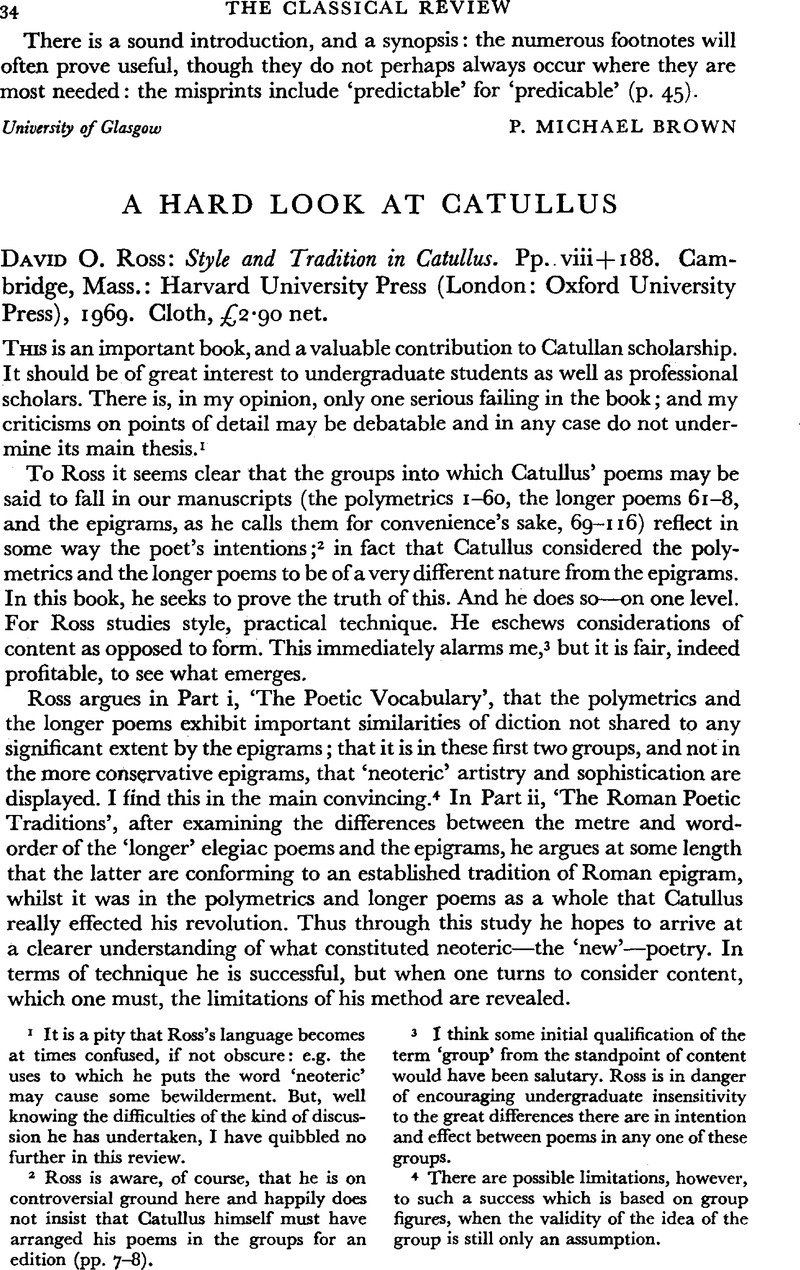No CrossRef data available.
Article contents
A Hard Look at Catullus - David O. Ross: Style and Tradition in Catullus. Pp.viii + 188. Cambridge, Mass.: Harvard University Press (London: Oxford University Press), 1969. Cloth, £2.90 net.
Published online by Cambridge University Press: 27 February 2009
Abstract

- Type
- Reviews
- Information
- Copyright
- Copyright © The Classical Association 1972
References
page 34 note 1 It is a pity that Ross's language becomes at times confused, if not obscure: e.g. the uses to which he puts the word ‘neoteric’ may cause some bewilderment. But, well knowing the difficulties of the kind of discussion he has undertaken, I have quibbled no further in this review.
page 34 note 2 Ross is aware, of course, that he is on controversial ground here and happily does not insist that Catullus himself must have arranged his poems in the groups for an edition (pp. 7–8).
page 34 note 3 I think some initial qualification of the term ‘group’ from the standpoint of content would have been salutary. Ross is in danger of encouraging undergraduate insensitivity to the great differences there are in intention and effect between poems in any one of these groups.
page 34 note 4 There are possible limitations, however, to such a success which is based on group figures, when the validity of the idea of the group is still only an assumption.
page 35 note 1 Ross seems to me to involve himself in excessive and muddled jargon in his concluding estimation of suauis on p. 80.
page 36 note 1 Poem 30 may well be an example.
page 36 note 2 Basically in fact the expression seems colloquial: cf. Kroll on Catull. 72.8; though its sense of course gains far greater significance in Catullus' context.
page 36 note 3 In: ‘Callimachus and Latin Poetry’, G.R.B.S. v (1964), 181–96.
page 36 note 4 Ross, 162: ‘The Greek mind behind the discovery of Callimachus and Alexandrian poetry (and all that it implied) has now been recognized to have been Parthenius of Nicaea, who came to Rome perhaps in 73 B.C. The importance of Parthenius cannot be overestimated: without his timely arrival there could have been no New Poetry…’ It is well known that Parthenius was friendly with Cornelius Gallus, and there is a tradition that he was Virgil's tutor in Greek (Macr. v. 18), but we know of no certain connection between him and the noui poetae, certainly not with Catullus. And why (loc. cit.) is it ‘unlikely that Cinna, Calvus, Catullus … could by themselves have understood or adopted Callimachean poetry’? As for the claim that it is unlikely that they could ‘by themselves have devised the vocabulary and technique necessary for the creation of a new genre’, it seems to me that it is especially here, and particularly in vocabulary, that they would have had to work things out for themselves; and would scarcely have turned reto a Greek for help if they had wanted it. One indication may be added of Parthenius' lack of influence in Rome. His collection περ⋯⋯ρωτικ⋯ν παθημ⋯των contains, it is true, many stories that reflect the late Alexandrian interest in passionate or unnatural love stories which reoccurs in Latin Alexandrian literature. But his idea of telling well-known types of stories (like those of Philomela and Scylla) under different, little-known names, and his choice in some stories of characters and tales with little or no connection with mythology whatsoever, had no serious repercussions.




